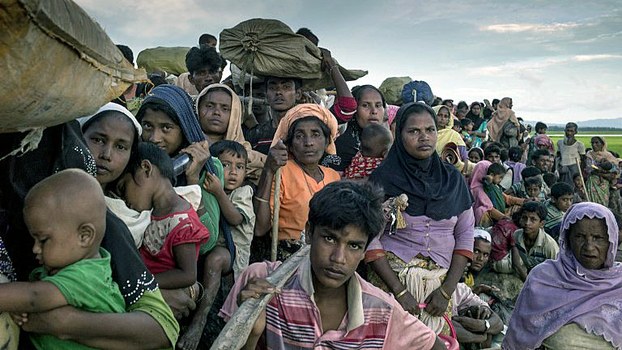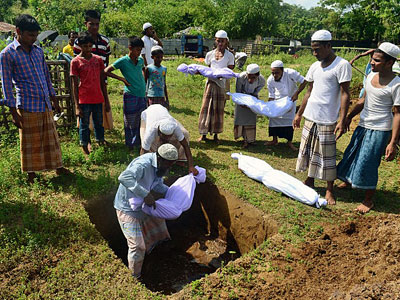




The Rohingya militant group responsible for deadly attacks on police outposts in Myanmar’s violence-wracked northern Rakhine state ended its month-long unilateral humanitarian cease-fire on Monday, a suspension of hostilities that the Myanmar military had rejected.
The Arakan Rohingya Salvation Army (ARSA), whose assaults on 30 police outposts and an army facility on Aug. 25 triggered a military crackdown on Rohingya Muslims that has driven more than a half-million villagers from their homes, said on Saturday that its self-imposed cease-fire would expire at midnight on Oct. 9.
The group’s “humanitarian pause” which began on Sept. 10 was a temporary cessation of offensives in Maungdaw, Buthidaung, and Rathedaung townships — the epicenter of recent violence and ethnic strife — so aid groups could reach people there.
“During this humanitarian pause, ARSA provided safe passage [to] and assisted thousands of victims fleeing into Bangladesh from Burma due to war crime[s], genocide, crimes against humanity, and ethnic cleansing committed by the Burmese military regime,” ARSA’s statement said.
The group blamed the Myanmar government for blocking humanitarian access to the region because of its “sustained military operations and a political strategy which uses mass murder, violence, arson, intimidation, and genocidal rape as tools of depopulation.”
Rights groups and the United Nations have accused the Myanmar military of crimes against humanity and ethnic cleansing in northern Rakhine amid numerous reports by Rohingya of soldiers murdering civilians, burning villages, torturing people, and raping girls and women.
The government has denied the allegations and blamed the killings and torchings of villages on the Muslim militants.
ARSA also called on the Myanmar government to “reinstate and restore the status of the Rohingya as a native indigenous ethnic group of Rakhine,” grant them all human rights guaranteed in the universal Declaration of Human Rights, and let them freely pursue their economic, social, and cultural development.
Buddhist-majority Myanmar views the Rohingya as illegal immigrants from Bangladesh and has denied them citizenship and basic rights, though many have lived in Myanmar for generations.
Late last week ARSA announced that it was willing to discuss a further cease-fire and the end of military offensives for the purpose of humanitarian access.
Myanmar Defense Minister Lieutenant-General Sein Win, who spoke to the media on Monday in the administrative capital Naypyidaw, said the government army did not recognize ARSA’s cease-fire.
“No government negotiates with terrorist groups,” he said. “We dismiss them [ARSA].”
Asked about the current security situation in Rakhine, he said the army and home affairs ministry are working together to ensure the rule of law and regional stability in northern Rakhine.
“But given the nature of the area, it is very large, so there may be some destruction if they [ARSA] want to carry out attacks,” Sein Win said.
Zaw Htay, director general of State Counselor Aung San Suu Kyi’s office, said on his Facebook page on Monday: “We have no policy to negotiate with terrorists.”
On Sunday, he wrote a post that Islamic organizations in Myanmar had condemned ARSA terrorists for their acts and urged Muslims to help stabilize the country.

Meanwhile, thousands of Rohingya Muslims from northern Rakhine continue to flee to safety in neighboring Bangladesh where many are succumbing to drowning incidents, dehydration, starvation, exhaustion, and illnesses.
On Sunday, at least 14 refugees, including children, died when their boat capsized while crossing the Naf River that separates Myanmar and Bangladesh.
The boat, which had up to 35 people on board, went down near Shah Porir Dwip on the southern tip of Bangladesh late on Sunday, Reuters reported, citing Bangladeshi police.
“Today’s drowning and tragic loss of life is yet more evidence of the desperate situation still prevailing in Rakhine state," said James Gomez, director of Southeast Asia and the Pacific for London-based Amnesty International, in a printed statement.
“While the Myanmar military has engaged in a campaign of violence, there is mounting evidence that Rohingya women, men, and children are now also fleeing the very real threat of starvation,” he said.
Rights groups and Rohingya who have made it to Bangladesh have indicated that violence is still occurring in northern Rakhine and that Myanmar has hindered the delivery of humanitarian aid, though the government has said that attacks and military operations ended on Sept. 5.
“The Myanmar authorities are actively blocking aid groups from reaching affected areas in northern Rakhine state, where people are on the brink of survival,” Gomez said. “These restrictions show a callous disregard for human life and must end immediately.”
Bangladeshi officials and relief agencies are struggling to provide food and basic health services to the nearly 519,000 Rohingya who have arrived in the country during the last six weeks and are living in makeshift shelters in refugee camps in the southeastern part of the country.
Reported by RFA’s Myanmar Service. Translated by Kyaw Kyaw Aung. Written in English by Roseanne Gerin.